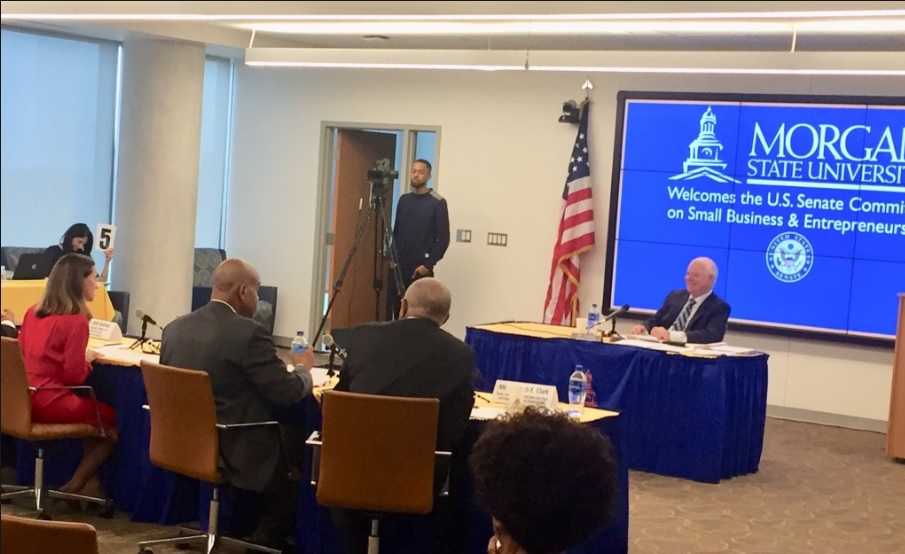
September 17, 2018
United States Senate Committee on Small Business and Entrepreneurship Field Hearing
On Friday, September 14, 2018, the United States Senate Committee on Small Business and Entrepreneurship held a field hearing at Morgan State University in Baltimore, Maryland to discuss strengthening access to capital for minority-owned small businesses. Mary Miller, Senior Fellow at Johns Hopkins 21st Century Cities Initiative, provided testimony on Baltimore’s financing system, presenting findings from two recent reports, Financing Baltimore’s Growth: Measuring Small Companies’ Access to Capital and Financing Baltimore’s Growth: Strengthening Lending to Small Businesses. Read an excerpt of the testimony below, or read the full testimony.
Baltimore is home to more than 50,000 small businesses. Roughly 37,500 of these businesses are sole proprietorships and about 12,500 have at least one employee. Small businesses form the backbone of the local economy, providing jobs for residents, tax revenues for the city, and a sense of identity to neighborhoods and commercial districts. But for new and established small businesses to thrive, the city needs a financing system with capacity to meet their needs. Capital is certainly not the only ingredient necessary for successful business growth, but it is a critical input. If companies lack access to appropriate types of capital at critical stages of growth, they are likely to never take off and achieve scale, or even worse, to go out of business or leave Baltimore and relocate where financial support is more readily available, depriving the local economy of jobs and economic growth.
To better understand whether Baltimore’s financing system and the flow of capital to small businesses is sufficiently expansive and diverse to support the entire landscape of the city’s small businesses and their varying needs, the Johns Hopkins 21st Century Cities Initiative (21CC) has spent the past two years analyzing data, interviewing experts, and convening stakeholders. 21CC has published two reports over the past year presenting a robust set of findings and recommendations relating to the local financing system. These reports are summarized below. The data provided here are drawn from the reports, where all original sourcing is provided.
The first report, published in September 2017 and titled Financing Baltimore’s Growth: Measuring Small Companies’ Access to Capital analyzed 40 separate public and private funding programs and data sources to quantify loan, equity, and grant investments in small businesses located in Baltimore City. Over the five-year period from 2011 through 2015 about $560 million per year totaling about 7,000 individual transactions flowed to startups and small businesses in Baltimore City.
Of the total dollar amount invested, 60 percent came in the form of loans, 30 percent in equity investments, and 10 percent in grants. There was significant annual growth in equity investments, increasing from $50 million per year in the mid-2000s to over $200 million per year a decade later. On the loan side, the report showed declines in the total amount of loans originated to Baltimore City’s small firms over the past decade.
Last month, 21CC published the second report, Financing Baltimore’s Growth: Strengthening Lending to Small Businesses, that takes a deeper look into the dynamics of bank lending to small businesses in Baltimore City. The report covers the period from 2007 to 2016, which is the most recent available 10 years of loan and deposit data that banks are required to report to federal regulators.

